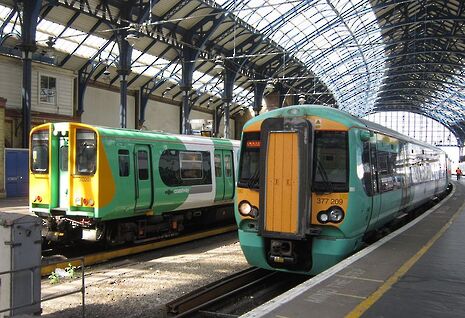Southern Rail doesn’t care – and neither do the unions
An unpleasant journey has Matt Gurtler questioning a broken train system

As I stood, crushed between another passenger and the sliding door, I couldn’t help but envy the Leader of the Labour Party; at least there had been enough space for him to sit on the floor of his train. The train was overcrowded simply because an earlier train of six carriages had been cancelled and all the passengers of that train, myself included, had been told to pile onto the later four-carriage train; 10 carriages of people, all crammed into four carriages. Furthermore, this four-carriage train arrived in London too late for me to catch my connection. My woes and those of many travellers were caused by the Southern Rail strike earlier this month.
This strike was organised by the RMT (Rail, Maritime and Transport) union in response to the recent proposition from Southern Rail regarding driver-only trains. These trains would have no need for guards; the drivers would take responsibility for closing the doors and all other guard duties. As a result, Southern Rail would save money and many train guards would lose their jobs. The RMT don’t see this as a fair decision. Their General Secretary, Mick Cash, has said that the move by Southern would “compromise jobs and safety on these dangerously overcrowded trains.” So strike action was organised, which resulted in 15 Southern routes running without service and five running with limited service, including the integral London to Brighton line.
The issue that we have here is that there are two competing factions, neither of which have the best interests of the public at heart. Southern Rail is a huge business with a market monopoly, interested primarily in making money, while the RMT union focuses on the welfare of transport workers. The RMT union strike ironically resulted in more dangerously overcrowded trains. Their motivation for the strike was to save jobs – and yet a strike seems an odd way to tackle that issue. Train guards are scared of losing their jobs so their response is to stop doing their jobs, therefore truly putting to the test whether they were ever needed at all.
So, what will happen next? The RMT union have scheduled more strikes for the beginning of September and are in ongoing talks with Southern Rail in an attempt to convince them to cancel their plans for driver-only trains. If Southern keep pushing this motion, it is likely that strikes will continue. Unfortunately for Southern, the union holds all the cards. If strikes continue, commuters and travellers will be seriously affected (as they were earlier this month) and they will point the finger of blame at Southern Rail, who will eventually have to give in to the union, or it will seriously harm them and their customers.
The issue with this strike is that nobody cares. Southern Rail don’t care that I fell out of the train doors every time they opened due to the sheer amount of people in the carriage and the RMT union don’t care that their strike caused this. All cynicism aside, Southern Rail is a business and wants to earn money. This is one argument for the nationalisation of railway companies.
In economic terms, one can argue that rail travel is a public good, meaning its consumption carries benefits for people who don’t pay to use it as well as for those who do. To take one example, if more people use trains, fewer cars will be on the road and there will be less congestion. In this way, everybody benefits from the purchase of a train ticket, although only one person bears the financial burden.
Therefore it is not unreasonable to suggest that railway companies should be publicly owned and financed, to some extent, by the taxpayer. This would also mean that the government would have some control over the actions of companies like Southern Rail, so strikes would not be so prevalent.
However, if the government were partly to own railway companies, a significant amount of money would be added to their expenditure. Money has to come from somewhere and the government would either have to make cuts to other public services or raise taxes, neither of which are ideal.
My train journey during the strike was highly unpleasant, and many other passengers experienced similar problems with their journeys, or even worse. Nevertheless, reinstating public ownership of rail networks to the detriment of other public services is simply unjustifiable. For the moment, we can just hope that Southern Rail will see that forcing the RMT union to strike will harm them as much as it will harm their customers.
 Comment / Plastic pubs: the problem with Cambridge alehouses 5 January 2026
Comment / Plastic pubs: the problem with Cambridge alehouses 5 January 2026 News / Cambridge businesses concerned infrastructure delays will hurt growth5 January 2026
News / Cambridge businesses concerned infrastructure delays will hurt growth5 January 2026 News / New movement ‘Cambridge is Chopped’ launched to fight against hate crime7 January 2026
News / New movement ‘Cambridge is Chopped’ launched to fight against hate crime7 January 2026 News / AstraZeneca sues for £32 million over faulty construction at Cambridge Campus31 December 2025
News / AstraZeneca sues for £32 million over faulty construction at Cambridge Campus31 December 2025 News / Uni-linked firms rank among Cambridgeshire’s largest7 January 2026
News / Uni-linked firms rank among Cambridgeshire’s largest7 January 2026








